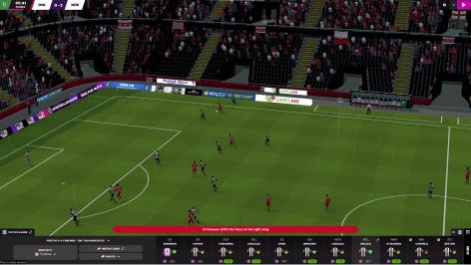Video games charity Games Aid recently appointed Terry Haynes and George Osborn (pictured) as their new co-chairs, replacing Des Gayle, the organisation’s former chair. Haynes is currently the business development manager at Studio Gobo, and Osborn works as head of campaigns and communications at Ukie.
PCGamesInsider.Biz spoke with George Osborn to discuss his new role at Games Aid, what the future of the organisation looks like and the positions the charity are currently recruiting for.
PCGamesInsider.Biz: What does your role at Games Aid entail?
Osborn: I’m the co-chair of Games Aid along with Terry Haynes. We have the responsibility of shaping the direction of Games Aid as a charity, working with the trustees to ensure it delivers on its goals and supports the charities – and by extension the young people – that the industry has called upon us to help.
Can you remind us a little of Games Aid’s history? How long has it been running and what has it achieved over the years?
Games Aid was first registered as a charity way back in July 2000 but formed properly in August 2008 which means it has been running for 15 years.
Games Aid’s mission is to support small charities that help young people, especially from disadvantaged backgrounds, across the country by acting as their bridge into the world of games.
Our democratic model means that fundraisers can trust that we support causes backed by games businessesGeorge Osborn
The charities are nominated by people in the games industry, our chosen causes are then selected by the Games Aid membership through an election and the money we raise is distributed evenly between the charities we back each year.
Games Aid has raised nearly £4.5m over that period of time, which is great. But because we back smaller charities, every pound has an even larger impact, giving our charities the kind of support that can make a major difference to the communities they support.
What are your hopes and ambitions for Games Aid moving forward?
Our ambition for Games Aid is to make sure that it is best placed to do as much good as possible for the people we support and the industry that backs us.
We know that we have a unique role, and opportunity, to channel the power, energy and decency of people working across the UK games sector into supporting some truly fabulous organisations doing invaluable work for their communities.
We have a responsibility as trustees to deliver on that promise and our ambition is to do that as effectively as possible.
Are you planning on changing anything in regards to how the organisation is run?
I think it’s fair to say that we’re considering how we can evolve to best continue the good work done so far. Games Aid has delivered significant good for a range of charities across the country through the hard work of its volunteer trustees, yet we know that the charitable landscape has changed. Fundraising in the charity sector, and at that intersection with games, has never been more active and that means we need to make sure we find the right place for us to do it.
Fortunately, Games Aid is well-positioned to do that. Our support for smaller charities makes us a perfect ‘bridge’ into fundraising through games; our democratic model means that fundraisers can trust that we support causes backed by games businesses; we also have a track record of making a real difference of over a decade.
It is important that we work with the industry to make sure that we maintain that position and build upon it in the coming year.
Lockdown has been really tough on charities. It’s a testament to the commitment of our trustees that they’ve managed to keep things goingGeorge Osborn
What is the relationship between Games Aid and other gaming charities, like Special Effect?
We have a great relationship with a range of charities in the industry and outside of it. Special Effect, for example, is a charity that Games Aid supported through its fundraising efforts in its early days and is one that I have a lot of personal fondness too (even if my legs are increasingly creaking under my own efforts to support it).
The Covid pandemic has had a serious impact on all fundraising organisations (although conversely, the games industry has thrived during this period). How will Games Aid be reacting as lockdown restrictions ease?
Lockdown has been really tough on charities, including Games Aid. It’s a testament to the commitment of our trustees that they’ve managed to keep things going during such a difficult time and I think we are all enormously grateful for the work they put in to do that. At the same time, the challenges that Covid has presented does give us food for thought about how Games Aid will operate in the future and an opportunity to reshape things.
We’re still planning to continue many of our well known in-person events like our comedy nights, golf days and go-karting competitions. But we are looking at ways of broadening our reach, both in terms of fundraising activities and the way we’re structured, to deliver on our mission as effectively as possible. This will mean a lot of hard work in the coming months but we’re looking forward to sharing where we’re going in early 2022.
What is the most innovative fundraising/charitable ideas you’ve heard of in the gaming world?
I think there have been some fantastic ways that games have supported good causes over the past few years.
I loved the charity auction run by Special Effect and Mediatonic to allow a brand to create a skin in Fall Guys, which raised nearly a million dollars for the charity. I thought Safe In Our World did a great job using the support from Jingle Jam last year to provide a range of free mental health training courses for community managers in games, which really is invaluable for the industry at large.
I’ve also enjoyed some really thoughtful in-game activities too. I’m still so pleased and excited to see Games Aid featured in Football Manager’s advertising hoardings (and not just because I’m a massive fan of the game, of course).

But I also thought initiatives like ustwo games planting trees for every time a copy of Alba: A Wildlife Adventure is downloaded was remarkably thoughtful too. It showed that the good games can do doesn’t need to be – and shouldn’t be – measured in cash terms alone and I think it’s a really important point to emphasise. Games have a capacity to reach huge audiences authentically and I think these examples show how that can translate into good for everyone.
Games Aid is currently looking for more trustees. What sort of people would get the most out of this participation, and what sort of commitment would they need to make?
Specifically, we’re looking for trustees with a background in business development and influencer outreach skills. We know that Games Aid has successfully raised money through traditional means, but we’d like to boost our wider fundraising portfolio.
Being a trustee is a pleasure, but it’s also a responsibility. Games Aid’s current model puts a lot of emphasis on trustees finding time to do good work on behalf of the charity, which means it is especially important to take that work seriously.
When we come together, we can do enormous good and helping us to do that helps us to communicate that to the wider worldGeorge Osborn
However, we’re also a friendly bunch and we do know that we’re all here with the motivation to do good. So if you feel like you would like to add some charity work on behalf of the sector and are ready to put a shift in, we’d love you to apply – whatever your background!
Let’s talk about “games for good”. Can you tell us why gaming companies should consider charity in general and Games Aid in particular as part of their corporate responsibility? What advice can you give to companies who want to do more?
Businesses can play a crucial role in enabling so much good in society. We know that corporate partnerships and sponsorships play an integral role in supporting charities across the country, so even diverting some funds from business to charity will make an enormous difference from a practical level.
But what’s really important is that businesses that take positive steps to support good in wider society see real benefits for themselves. Consumers and employees increasingly examine the values and causes that companies support to see if it lines up with what they believe. Taking an active step to support causes close to the heart of the people you work with helps cement those relationships, delivering benefits to everyone.
Looking at Games Aid by itself, there are some really tangible reasons why you should back us. Aside from the undoubted benefit of supporting a range of young people across the UK, supporting Games Aid helps us to make a statement of intent about the power of collective industry action. When we come together, we can do enormous good and helping us to do that helps us to communicate that to the wider world and that’s definitely worth helping out with.
Are we seeing more charities look to games to help? What advice can you give to charities that see games and gamers as a potential source of fundraising?
Yes, we’re seeing more charities than ever look to games for support. I actually joined Games Aid as a trustee because I have been contacted by so many charities looking to fundraise through games in my day job at Ukie that I felt I should go chip in with the industry charity!
My main advice for charities looking to games as a fundraising or awareness opportunity is to take time to understand the sector. The games sector has a distinct culture and operating model and this means that many of the approaches used to fundraise outside of games don’t really match up with the opportunities to raise money in-game or through streaming.
Anyone watching your stream can be transformed from a viewer into a donor in an instant with a range of cool toolsGeorge Osborn
The best way for charities to benefit from games is to take time to get to know the industry, meet people in the sector, be visible at events where possible, ask questions and find that authentic way to attach your cause to the interest of players or the industry. We’re a friendly bunch and are happy to give a steer.
How can YouTubers, Twitch streamers and influencers play a role in future fundraising efforts?
The easiest way is to integrate a campaign from Tiltify, Streamlabs Charity or another service into your stream. By taking ten minutes to set up an account, set a fundraising target for a cause, and pop the overlay onto your stream, anyone watching your stream can be transformed from a viewer into a donor in an instant with a range of cool tools.
I’ve seen the value of it first hand, where a fundraising stream I ran at very short notice over at Ukie generated £3000 through donations on Tiltify for a range of mental health charities. It’s why we’ve set that up with Games Aid, but we recommend you take a look through the causes in case there is a great cause that you wish to back.
But equally, don’t underestimate the value of publicly supporting a cause. Taking the time to explain why a charity matters to you on your stream or socials – and either sharing key messaging or linking back to them – is a really positive way to drive change and I encourage streamers and Youtubers to take the time to do it.
The Games Aid application deadline for Trustees is Friday 5th November and you can apply at the Games Aid site. George Osborn is speaking at Pocket Gamer Connects Digital NEXT this month.













